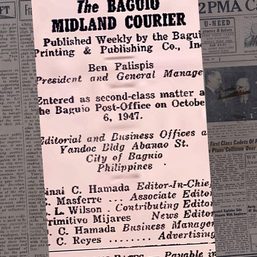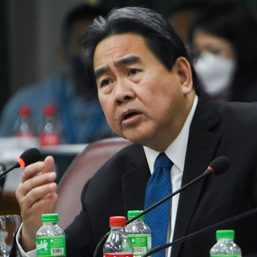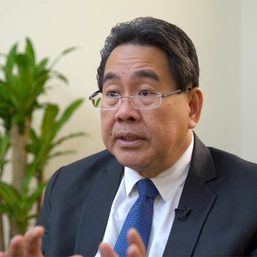SUMMARY
This is AI generated summarization, which may have errors. For context, always refer to the full article.
![[Newspoint] The lucky one](https://www.rappler.com/tachyon/2024/04/lucky-one-april-18-2024.jpg)
Ferdinand Marcos Jr. is one lucky president, indeed, probably luckier than any other – so far, anyway.
Gloria Arroyo had her own share of unusually good fortune, stepping up from vice-president to replace an impeached president in midterm (2001), then managing to stay on for a regular six-year term (up to 2010) – by a rigged vote. But after that she had to spend nearly four years in detention, charged with plunder, although again, a Supreme Court she had time to pack during her long presidency invalidated the case against her.
Her home district has voted her to Congress multiple times, allowing her to keep no small measure of power, but in a power realignment recently, having picked the wrong side, she was marginalized from the coalition. Now 77 and little heard from lately, she appears resigned to her fate.
Marcos’ father, Ferdinand Sr., had had a good ride himself, but once he lost his grip he plunged straight to his tragic finish. The plunge began when his health declined terminally in the last three or four years of his 14-year dictatorship. Not a second kidney transplant could save him, and neither could his 10-billion-dollar (P560-billion) stash of loot buy him more time. Less than three years after being booted out into exile in Hawaii, in 1986, he was dead, at 72.
It was from that ignominious past that Junior has risen with incredible luck. As a first heir, he surely got a prime share in the loot. Half of that supposedly has been recovered by the state, but still, $5 billion is $5 billion – and that’s not yet counting any interest and other gains that may have been made on it over the years.
For some idea of how much Junior got for himself, and further gets to preside over as an executor, the Supreme Court has a standing order for him to pay the P203-billion, fines included, in estate taxes assessed by the Bureau of Internal Revenue. But of course, president now, he feels even more entitled to not pay, and nobody is telling him. And that’s not even half his luck.
(The law professor Mel Sta. Maria writes in this site about two other cases in which Junior avoids paying debts in defiance of court rulings: one, reparation for victims of torture and for orphans of those murdered or disappeared and presumed killed during his father’s Martial Law rule; and, two, a forfeiture for the state of 658-million-plus plundered dollars – around P37 billion. READ: [Just Saying] Marcos: A flat response, a missed opportunity).
Luck in fact has rained generously on the Marcoses since their return from exile, in 1991. Their repatriation was part of an arrangement under which their Swiss bank accounts were to be kept frozen until after their cases had been decided by a Philippine court. It turned out to be just the perfect deal for them.
Coming home to a generally quiet acquiescence by the nation they had robbed and a lapdog embrace from old friends and cronies, they knew they were back in business. The widowed matriarch, Imelda, was flagrantly remorseless, strutting around without missing a step. She would be found guilty of graft years later, but, already 89 at the time of her sentencing, although kept active by luxurious living, she gave the court an excuse to spare her jail. Ninety-five in July, she would have by then served the minimum six years if she had actually gone in.
Since their homecoming, mom and children Imee and Junior had been elected regularly to Congress. Their rehabilitation became consecrated with first-son Junior’s ascension to the presidency. He was the obvious anointed, not first-born Imee – she may have lost out because of her immodest tendencies, notably her limelight-hogging and her streak of condescension.
And luck does seem to ride with the choice. Junior’s loss to Leni Robredo in the vice-presidential contest of 2016 would seem itself a lucky loss. Being from the opposition, Robredo was sidelined, starved of budget and other resources, by President Rodrigo Duterte. Junior, meanwhile, had time on his own to ripen for his presidential run uncontaminated by Duterte. The autocratic narcissist that he is, Duterte simply could not be stopped leaving a mess that would make a scarcely capable and sincere successor look good. Again, perfect for Junior.
On Duterte, even a pandemic had no chastening effect at all. Using it as a pretext for militarization, he recycled newly retired generals for top posts in the civil service. He also allowed the emergency to be exploited for corruption, looking the other way as the health insurance agency was mismanaged and fat contracts for medical services and supplies were cornered by the well connected for insane profits.
But President Ferdinand Marcos Jr. tends to align his priorities to the public mood and at the same time avoid issues that could inspire ugly recollections, like militarization and corruption precisely. And also drugs, to which Duterte associates him, as an indulger. No wonder, the heed he has paid Duterte’s war on drugs is out of all proportion to its monstrous brutality. That war left a trail of blood that reached the International Criminal Court, in The Hague. In its first year alone, it got 20,000 killed, mostly drug users, street retailers, and other small fry, earning Duterte a citation from that court.
Yet again, as luck would have it, Junior has found the one issue tailor-made for his PR presidency: the West Philippine Sea.
Right upon taking office, President Duterte surrendered control over it to China, which, after agreeing to international arbitration, refused to accept the arbitral court’s ruling affirming the Philippine claim on those strategic and resource-rich waters. Duterte’s treason opened the territory for military occupation and commercial exploitation by the Chinese, deprived Filipino fisherfolk of their traditional living off it, and cramped Philippine Coast Guard operations there. It has also caused anxiety among other nations with territorial disputes with China in the neighborhood as well as nations accessing the sea as a waterway.
Marcos is now reasserting Philippine sovereignty over the territory and rallying allies to the cause. He has allowed American troops to take up positions inside Philippine military camps located in strategic relation to the West Philippine Sea. Ports are similarly made accessible. The Philippines has a long-standing treaty with the United States for mutual defense.
With Australia, a robust neighbor, the Philippines oftener than usual now holds military exercises, as it does with the US, and lately with France too.
Only last week President Marcos met in the US capital, Washington, DC, with the US President, Joe Biden, and Prime Minister Fumio Kishida, of Japan, another old ally. Although trade and investment were reported in the public disclosures as the subjects that dominated the talks, the signal could not have been lost on China.
By the surveys, Junior seems doing better than the number shows on its face: 79% is with him on the West Philippine Sea – that’s nearly eight in 10 citizens of a nation with an economic elite sizably made up of Chinese descendants, not to say a nation made uncomfortable by its long colonial history hosting foreign armed forces.
The mood, I guess, reflects a sense of exigent pragmatism. But what about the rest of life? What about issues of daily survival like prices, wages, and health, and of decent living like education, morals, justice? – Rappler.com
Add a comment
How does this make you feel?
![[Closer Look] ‘Join Marcos, avert Duterte’ and the danger of expediency](https://www.rappler.com/tachyon/2024/06/TL-trillanes-duterte-expediency-june-29-2024.jpg?resize=257%2C257&crop_strategy=attention)

![[Newspoint] A Freedom Week joke](https://www.rappler.com/tachyon/2024/06/20240614-Filipino-Week-joke-1.jpg?resize=257%2C257&crop_strategy=attention)












![[Hindi ito Marites] Japan: From enemy to bestie](https://www.rappler.com/tachyon/2024/07/Hindi-ito-Marites-TC-ls-7.jpg?resize=257%2C257&crop=415px%2C0px%2C1080px%2C1080px)

![[Rappler’s Best] America](https://www.rappler.com/tachyon/2024/07/rapplers-best-america.jpg?resize=257%2C257&crop=458px%2C0px%2C1080px%2C1080px)








There are no comments yet. Add your comment to start the conversation.